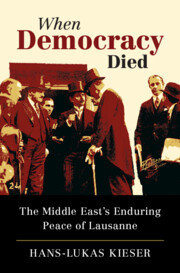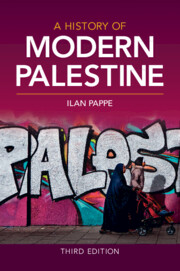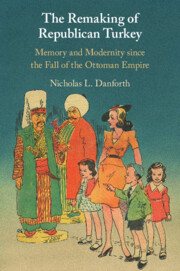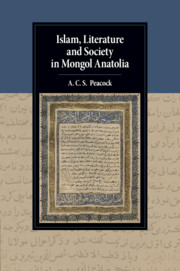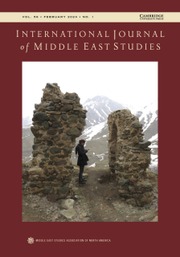When Democracy Died
The Middle East's Enduring Peace of Lausanne
$39.99 (P)
- Author: Hans-Lukas Kieser, Universität Zürich
- Date Published: April 2023
- availability: Available
- format: Hardback
- isbn: 9781316516423
$
39.99
(P)
Hardback
Other available formats:
eBook
Looking for an examination copy?
If you are interested in the title for your course we can consider offering an examination copy. To register your interest please contact [email protected] providing details of the course you are teaching.
-
The Treaty of Lausanne, signed in Switzerland in July 1923, officially settled the conflict between the Ottoman Empire and the Allied forces. Not only did the Treaty establish the borders of the modern Turkish republic, but it also defined boundaries, political systems, and understandings of citizenship in the newly formed post-Ottoman nation-states. Here, Hans-Lukas Kieser recounts how the eight dramatic months of the Lausanne Conference concluded more than ten years of war and genocide in the late Ottoman Empire. Crucially, the Treaty was in favour of a homogeneous Turkish state in Asia Minor and became the basis for the compulsory 'unmixing of people' that facilitated the persecution of minority groups, including Armenians, Kurds, and Arabs. Not only did this significant yet oft-overlooked treaty mark the end of the League of Nations' project of self-determination and security for small peoples, but it was crucial in shaping the modern Middle East, and dictatorships in Turkey and Europe.
Read more- Places the Treaty of Lausanne in context by outlining the decade of war that preceded it
- Explores the making of republican Turkey and the post-Ottoman Middle East through questions of democracy, peace-making and state building
- Provides vivid insights into the political worlds of the key actors
Reviews & endorsements
‘Rather than viewing the Treaty of Lausanne from the perspective of the victorious founders of the Turkish Republic, this critical study examines the Treaty from that of its losers. Kieser convincingly argues that the Treaty legalized and rewarded ethnic cleansing; sounded the death-knell for democratic self-determination; and ushered in extreme nationalist, authoritarian rule in Turkey.’ Marc Baer, London School of Economics
See more reviews‘This study gives an original interpretation of the Lausanne Treaty. It allows us to understand the emergence of the two new regimes of the post-Great War period: fascism in Italy and Kemalism in Turkey, which, together with the Bolshevik Soviet Union, considered themselves to be the pillars of an antidemocratic age to come.’ Hamit Bozarslan, EHESS, School for Advanced Studies in the Social Sciences, Paris
‘Kieser offers an important corrective to histories of modern Turkey. He shows that ‘colonialism’ is not the only process to blame for the Middle East’s anti-democratic tradition, and that Europe owes some of its interwar fascism and ultranationalism to the Lausanne Conference. The Lausanne Treaty, the book shows, reads like a manual on how to get away with genocide. Germany was watching.’ Lerna Ekmekcioglu, Massachusetts Institute of Technology
‘In this brilliant study, Kieser shows how the Lausanne Treaty proved both a crucial endpoint of the Paris system and the basis for the rise of authoritarianism. Carefully researched and cogently argued, it finetunes understandings of fascism by revealing the family resemblances between Turkey and other regimes that sought to eliminate minorities.’ Michelle Tusan, University of Nevada, Las Vegas
Customer reviews
Not yet reviewed
Be the first to review
Review was not posted due to profanity
×Product details
- Date Published: April 2023
- format: Hardback
- isbn: 9781316516423
- length: 342 pages
- dimensions: 235 x 159 x 24 mm
- weight: 0.63kg
- availability: Available
Table of Contents
Introduction. The historic near east peace of Lausanne
1. A century's pivotal 'peace'
2. Against the Paris-Geneva peace: Bolsheviks, Turkists, Islamists
3. A protracted conference: redefining Turkey, western realpolitik.
Sorry, this resource is locked
Please register or sign in to request access. If you are having problems accessing these resources please email [email protected]
Register Sign in» Proceed
You are now leaving the Cambridge University Press website. Your eBook purchase and download will be completed by our partner www.ebooks.com. Please see the permission section of the www.ebooks.com catalogue page for details of the print & copy limits on our eBooks.
Continue ×Are you sure you want to delete your account?
This cannot be undone.
Thank you for your feedback which will help us improve our service.
If you requested a response, we will make sure to get back to you shortly.
×
